Russia bans all U.S. food, EU fruit and vegetables in sanctions response; NATO fears invasion
RIA quoted the spokesman for Russia's food safety watchdog VPSS, Alexei Alexeenko, as saying all European fruit and vegetables and all produce from the United States would be included in a ban drawn up on the orders of President Vladimir Putin to punish countries that imposed sanctions on Russia.
Earlier, Alexeenko told Reuters bans on EU and U.S. goods would be "quite substantial", and would specifically include U.S. poultry, although he declined to give a full list of banned goods. He could not be reached again after the RIA report.
The war of economic sanctions has escalated even as fighting has intensified on the ground in eastern Ukraine in the three weeks since a Malaysian airliner was shot down over territory held by pro-Russian rebels.
NATO said on Wednesday Russia had massed around 20,000 combat-ready troops on Ukraine's border and could use the pretext of a humanitarian mission to invade. It was the starkest warning yet from the Western alliance that Moscow could mount a ground assault on its neighbour.
As rebels have lost ground to Ukrainian government troops, Russia announced military exercises this week near the border.
"We're not going to guess what's on Russia's mind, but we can see what Russia is doing on the ground – and that is of great concern. Russia has amassed around 20,000 combat-ready troops on Ukraine’s eastern border," NATO spokeswoman Oana Lungescu said in an emailed statement.
Moscow could use "the pretext of a humanitarian or peace-keeping mission as an excuse to send troops into Eastern Ukraine", she said. A NATO military officer, speaking on condition of anonymity, said Russia's build-up at the border included tanks, infantry, artillery, air defence systems, logistics troops, special forces, and aircraft.
A Russian defence ministry spokesman dismissed the NATO accusations: "We've been hearing this for three months already."
Moscow annexed Ukraine's
Crimea peninsula in the Black Sea in March, and Western countries say it
has funded and armed pro-Russian rebels since they rose up in east
Ukraine in April.
Over the
past two months, government troops have fought back, gaining ground
against the rebels, who are led almost exclusively by Russian citizens
and have managed to acquire tanks, missiles and other heavy weaponry
that Kiev and its Western allies say can only have come from across the
frontier.
Kiev said 18
Ukrainian servicemen had been killed and 54 injured in 25 separate
clashes over the past day in eastern Ukraine. Military spokesman Andriy
Lysenko said troops had been shelled from inside Russian territory and
frontier guards had come under a four-hour mortar and artillery attack.
Fighting has intensified since Malaysia Airlines flight MH17 crashed on
July 17, killing all 298 people on board. Western countries say it was
shot down by rebels with an advanced anti-aircraft missile supplied by
Russia. Moscow denies blame, and the Russians who command the rebels
deny they had such missiles.
The United States and the EU imposed
sanctions on Russia that were mild at first but have been tightened
sharply since the airliner was brought down, now targeting Russia's
defence, oil and financial sectors.
On Wednesday, Putin
ordered his government to come up with a list of agricultural products
from countries that had imposed sanctions on Russia, which would be
banned in retaliation. He told the government to avoid measures that
would hurt Russian consumers, but the blanket bans reported by RIA were
about as sweeping as could be.
Russia imported $43 billion worth
of food last year. According to the European Commission, Russia bought
28 percent of EU fruit exports and 21.5 percent of its vegetables in
2011.It was the second biggest buyer of U.S. poultry after Mexico last year, accounting for 8 percent of U.S. chicken meat exports, according to the U.S. Department of Agriculture. U.S. poultry has been ubiquitous in Russia since the early days after the Soviet Union, when cheap American chicken quarters sold at street markets were called "Bush's legs" after the president.
SIEGE Kiev's military offensive has pushed the rebels out of many of their strongholds, leaving them largely besieged in the cities of Donetsk and Luhansk, which the rebels have proclaimed capitals of two "people's republics".
Residents in Donetsk, east Ukraine's main industrial hub and now the principal rebel redoubt, said Ukrainian warplanes had carried out air strikes overnight.
Reuters journalists heard the planes roar overhead and massive explosions during the night. In the morning, an industrial district 2-3 km (1-2 miles) from the city centre was pocked with craters, including two huge holes 7 metres (7 yards) wide and 2 metres deep, ripped into the asphalt.
"The planes were flying low. Then there were two massive explosions and the glass was blown out of the window. It was terrifying. This is war. There will never be peace," said Nadezhda, a woman who lived nearby.
Government military spokesman Lysenko denied Ukrainian planes had
carried out air strikes: "The Ukrainian military does not bomb the towns
of Donetsk and Luhansk or any other similar populated places," he said.
Many residents have fled the two cities, but hundreds of thousands of
people are still living in them, increasingly fearful that they will
bear the brunt of a full-blown assault.
The latest Russian troop build-up on the border is not the first time
Moscow has concentrated forces there: NATO estimated Russia had as many
as 40,000 troops in place earlier in the crisis before Putin pulled them
back in June.
But the government's
advance since then may be prompting new action from the Kremlin, after
months in which state-controlled Russian media have mounted a sustained
campaign of anti-Ukrainian agitation and nationalist pride focused on
Crimea.
Since March, Putin
has vowed to use military force to protect Russian-speaking
"compatriots" across the former Soviet Union. He branded southern and
eastern Ukraine "New Russia", a name the rebels took up as catch-all for
most militia groups.
Most
people in eastern and southern Ukraine identify themselves as ethnic
Ukrainians who speak Russian as a native language. Outside of the two
provinces partly occupied by the armed separatist fighters, most have
rallied behind Kiev, despite reservations about the government there.
Polish Prime Minister Donald Tusk said on Wednesday the threat of a
direct intervention by Russia's military in Ukraine has risen over the
last couple of days.
A senior U.S. official said Washington was keeping a "very close eye" on Russian activity at the border.
“The last few weeks have not been good ones for the Russians. They have
seen the separatists lose ground and the Malaysian airliner shoot-down
was a public relations disaster for the Russians. Unfortunately we have
not seen a sense that the Russians are acting on the negative feedback
and looking to deescalate. In fact we’ve see signs that Putin seems to
be doubling down,” said the official.
“There’s the buildup on the border, no change in the propaganda machine
in Russia, talk of the need for humanitarian peacekeeping in Ukraine
itself."
(Additional
reporting by Natalia Zinets and Richard Balmforth in Kiev, Lina Kushch
in Donetsk, Barbara Lewis and Tom Koerkemeier in Brussels, Dmitry
Zhdannikov and Maria Kiselyova in Moscow, Matt Spetalnick and Mark
Hosenball in Washington and Adrian Croft in London; Writing by Peter
Graff; editing by David Stamp)


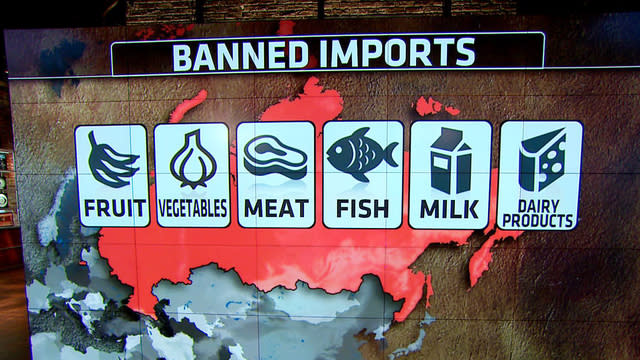
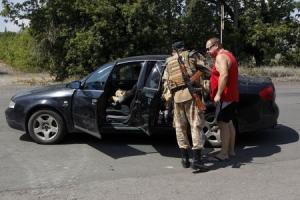
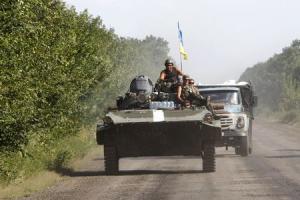
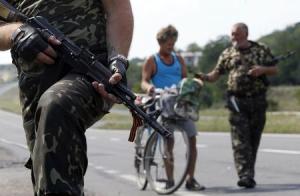
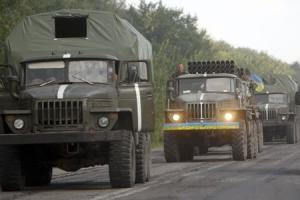
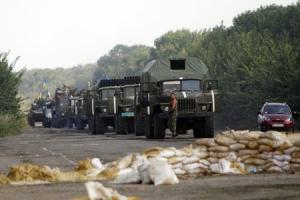
No comments:
Post a Comment